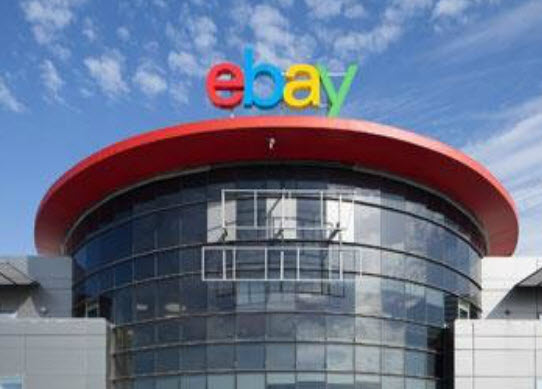DHL notes massive rise in Israeli imports and shift in online sales, as eBay Israel launches platform to boost local businesses
Shipping giants and e-commerce websites are shifting their business models in order to meet a massive surge in demand as people around the globe stuck at home under quarantine or shelter-in-place orders flock online to buy products.
In Israel and the United States, couriers have been forced to adapt quickly in order to avoid shipping delays and meet a spike in online shopping.
“Since the very first day this virus erupted in China, [it] has affected DHL really dramatically and seriously,” Yonathan Ivgi, commercial director at DHL Express Israel, told The Media Line. “We needed to look at this on the local and global perspective at once because we understood from the very first second that it would be a global crisis.”

A campaign launched by DHL Israel showing a courier holding up a sign asking customers to stay indoors in order to prevent the spread of COVID-19. (Courtesy)
DHL is a division of Deutsche Post DHL, the world’s largest logistics company, which operates via air and sea in over 220 countries and territories.
“The coronavirus has affected nearly every possible business in the world and those businesses are our customers,” Ivgi continued. “In the first stage, we needed to make sure that we had a strong network that could survive any possible scenario. So we came prepared to deal with this crisis when it hit Europe and Israel.”
Nearly 60% of DHL’s total workforce is currently working from home, Ivgi emphasized, while operational personnel have been equipped with masks and other protective materials aimed at preventing them from contracting COVID-19.
Aside from these changes, Ivgi noted that shipping demands have drastically increased in recent weeks, especially for medical goods such as masks and other devices.
“Right now, we have thousands and thousands of shipments waiting for pick up in China,” he revealed. “Import into Israel is crazy in the last two weeks, I can’t share the exact number but we’re talking about a very serious increase. We’ve put more planes coming into Israel and enlarged our planes that we already have.”
According to Ivgi, most imports into Israel come from China and are of coronavirus-related materials. However, the shipment of business products – many of which have no other option but to rely on a courier now – is also growing at a fast pace.
“Regarding private consumption, [a month ago] we started seeing a dramatic increase in the number of shipments from Israeli consumers,” Ivgi said. “It’s the same phenomenon that we see all over the world. … With DHL, people don’t need to expect any delay; we’re working around the clock.”
One of the factors affecting consumer spending habits is boredom, especially as lockdowns remain in effect and many spend long hours inside their homes. Israelis are mainly purchasing basic necessities like food, entertainment and educational products like books and toys for children, as well as electronics and sporting goods.
Another major factor affecting online buying in Israel, according to Ivgi, is Amazon.
Whereas Amazon’s international site has drastically reduced shipping to the country, the Israeli site – which went live last September – is offering Israeli shoppers a 10% discount on all purchases (up to $20 off). In the US, the online retailing giant has been grappling with a surge in demand and has reportedly been unable to deliver packages to customers in one or two days as it had been accustomed to doing before the pandemic. Because of this, in March the company announced that it would hire 100,000 warehouse workers and couriers to meet with the swell in online shopping.
DHL meanwhile has a fleet of 300 cargo planes operating around the globe, which has enabled it to continue shipments unabated. Since the majority of shipments are loaded onto commercial airplanes on a normal day, shipping capacity has also been dramatically affected by the coronavirus.
Bea Garcia, director of media relations for DHL in the Americas, echoed Ivgi’s statements and said that the company’s business protocols were continuously being updated as the situation evolves.
“As a globally operating company, epidemic and pandemic risk scenarios are an integral part of the [DHL] Group’s continuous risk planning,” Garcia told The Media Line in an email. “The safety of our employees and customers is paramount.
“Therefore [DHL]’s task force monitors the situation daily, coordinates with international organizations (WHO, CDC, ECDC and Robert Koch Institute) and provides the necessary information to all employees and relevant operations,” she wrote, adding that she could not provide additional information regarding specific measures being used to safeguard American employees because the directives are dependent on the situation in each given state.
eBay Launches New Program for Israeli Businesses
E-commerce websites have also noted a surge in online shopping and are rushing to meet demand. Some are even encouraging businesses – which have been shuttered in many countries to prevent the spread of COVID-19 – to move their operations online.

Smadar Salomon, a public relations spokesperson for eBay Israel, told The Media Line that the company just launched a program aimed at boosting small- and mid-sized businesses in the country.
“eBay is offering small business owners in Israel many perks at the moment,” Salomon told The Media Line. “Whoever wants to open up shop [on the site] can do so for free and with lower fees. We’re trying to promote Israeli businesses.”
As part of the initiative, the online shopping giant will enable approved Israeli businesses to operate for free on the site over a three-month period. Companies wishing to register can do so via this link [3] (in Hebrew only).
Regarding online shopping trends, Salomon said that Israel has significantly boosted its export of face masks, hand sanitizer, video games and musical instruments. Whereas international shipments might be faced with unforeseen delays, she asserted no such issue exists with local shipments.
In a report shared with The Media Line, eBay revealed that the majority of Israeli businesses on the site reported “significant increases” in sales to the US, England and Canada. In fact, the report showed an 800% increase in Israeli sales of face masks and thermometers, mainly to Chinese and American buyers; a 40% increase in sneaker sales; and a 44% rise in the sale of hair dye, primarily to the US and England.
Jordan Sweetnam, senior vice president and general manager of eBay’s Americas Market (Canada, US and Latin America) revealed that consumer shopping habits have drastically shifted in recent weeks following the coronavirus outbreak.
Among the top items being sold in Canada, the US and Latin America are home office equipment and personal care items such as webcams (1,000% increase year-over-year); computer monitors and stands (140% rise); hair color (155%) and nail care (255%) items. On the entertainment side of things, puzzles (1,395%), virtual reality headsets (765%), and video game consoles (365%) have all seen a major boost. As gyms in many places remain shuttered, another category with skyrocketing sales is workout equipment such as barbells and weights (854%) and yoga- or Pilates-related items (284%).